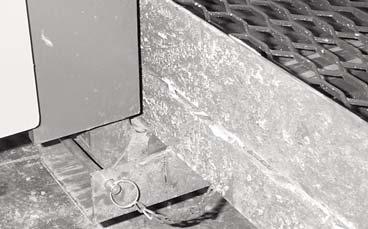
2 minute read
TRANSPORTING BETWEEN JOBSITES
WARNING
Operating conditions such as slopes or soft ground can reduce the machine’s safe operating capacity. Exceeding the capacity when raising or extending the boom will cause the machine to tip forward.
manner.
Load Elevation and Placement
For ground level load placement, be sure the area under the load and around the machine is clear of equipment and personnel. Lower the load to the ground, tilt the forks to the horizontal position, and then carefully back away to disengage forks from the load.
For elevated or overhead placement, bring the machine
as close as possible to the landing point, and then: 1.Level the machine BEFORE raising the load. Use extreme caution for high placement. Be sure personnel are clear of the area where the load or the machine could tip or fall. 2.Set the parking brake, hold the service brake pedal in fully applied position and slowly raise the load, maintaining a slight rearward tilt to cradle the load. 3.As the load approaches the desired height, feather the boom control at minimum speed until the load is slightly higher than the landing point. 4.Continue the feathering technique and lower the load into place. 5.Free the forks from the load by alternately retracting and raising the boom. If this process is not possible, very slowly and carefully reverse the telescopic handler to free the forks from the load. 6.Lower the forks to travel height.
WARNING
NEVER travel with the boom above the carry position (attachment tool should be at minimum ground clearance). Boom should be fully retracted.
Use lower gears when traveling down an incline. NEVER coast with the transmission in neutral. Travel up and down grades slowly.
DO NOT operate the machine on a slope or grade that exceeds 22% or 12o . Installing a Personnel Work Platform (PWP)
1.Center the forks on the carriage, spaced apart to match the distance required to engage the PWP. 2.After the forks are fully engaged in the PWP, secure the PWP to the forks. This can be accomplished by means of a retaining pin behind the heel of the forks as shown. 3.Secure the forks from pivoting upward in case the
PWP is lowered onto an obstruction. This can be accomplished by using the chain supplied with the PWP, to secure the lower portion of the PWP to the bottom of the carriage, as shown. 4.On 40’ and 44’ models, connect the coiled wire from the remote shutdown switch to the connec-
WARNING
The machine must not be used to lift or carry personnel or be fitted with any form of personnel work platform unless fitted with the optional PWP System. If fitted with the PWP System, the Mandatory Work Platform Safety Rules (p. 13) must be followed at all times while lifting personnel.
Retaining Pin








